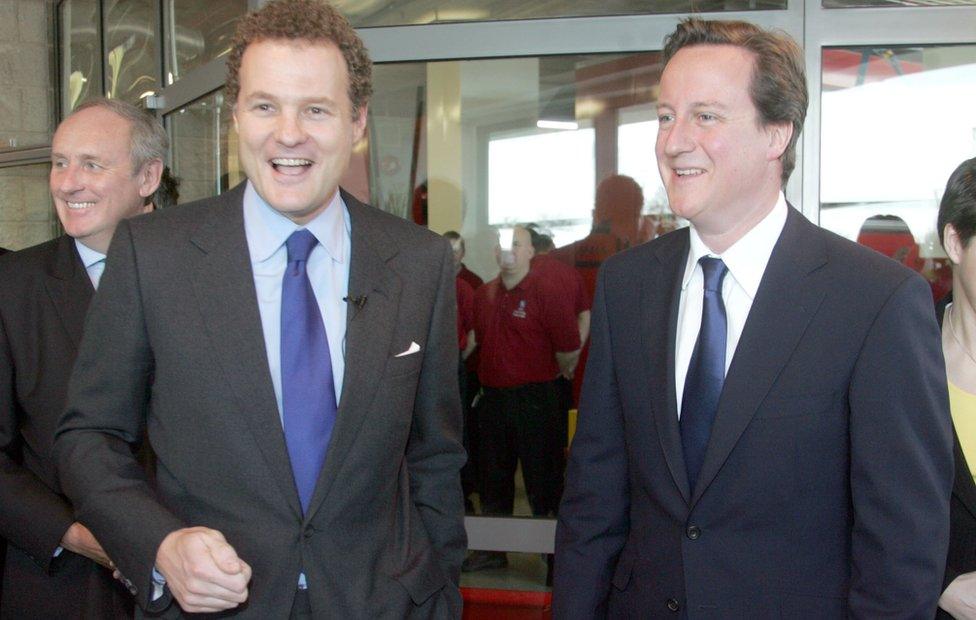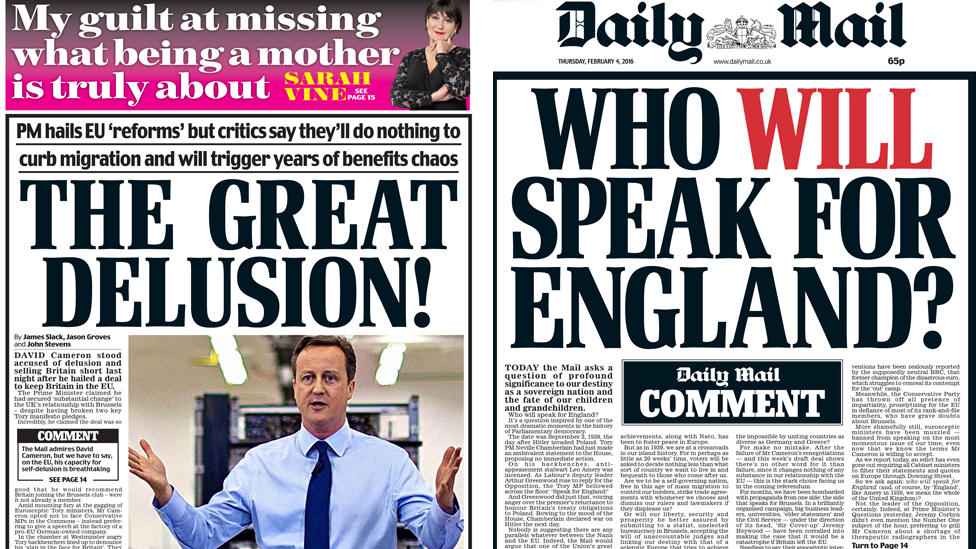David Cameron 'tried to get Mail editor sacked' over Brexit stance
- Published
Emily Maitlis: "This is the story of a very personal stand-off"
The proprietor of the Daily Mail told its editor that David Cameron pressed for him to be sacked during the EU referendum, BBC Newsnight has learned.
Lord Rothermere told Paul Dacre the prime minister urged him to rein in his pro-Brexit editor, then suggested he sack him, a source told the BBC.
The Mail mounted a vociferous campaign for Brexit in the run up to the vote.
A spokesman for Mr Cameron said he "did not believe he could determine who edits the Daily Mail".
The disclosure casts fresh light on one of the most bitter personal enmities of the Brexit campaign.
Newsnight understands the prime minister personally tried to persuade Mr Dacre to "cut him some slack" in a private meeting in his No 10 Downing Street flat on 2 February, the day European Council President Donald Tusk unveiled details of the deal negotiated by Mr Cameron for the UK.
Mr Dacre told Mr Cameron he would not temper his editorial line on Brexit because he had been a committed Eurosceptic for more than 25 years and believed his readers were too.
In early March, Mr Dacre was told by a Westminster source that the prime minister had tried to persuade Lord Rothermere, a strong supporter of the UK remaining in the EU, to sack him.
The Daily Mail editor was said to be "incandescent" and his resolve to campaign for Brexit "stiffened".

Daily Mail proprietor Lord Rothermere (left) was in favour of the UK staying in the EU
Only after the referendum, in July, did Lord Rothermere tell his editor of the pressure he said the prime minister had applied.
The Daily Mail's sustained and strident campaign for Brexit is regarded by some observers as a significant factor contributing to June's historic vote to leave the EU.
Though the Mail backed Mr Cameron in the 2015 election campaign, Mr Dacre and the prime minister had enjoyed a frosty relationship since Mr Cameron ordered the Leveson inquiry into media ethics in 2011.
According to one source, Mr Dacre refused to take Mr Cameron's calls for months following the launch of the inquiry.

The Daily Mail mounted a vociferous campaign for Brexit
BBC media editor Amol Rajan said: "In one sense we talk endlessly about the power of newspapers diminishing, but in terms of one newspaper, one editor job, their power seems as strong as ever.
"Number 10 and Westminster are still obsessed to an astonishing degree about what newspapers say.
"At some point, the message has to go out that not only can prime ministers not get editors removed from their positions - that's a very 20th Century way of looking at things - but they should spend less time thinking about influencing newspapers and more time thinking about new media, where more people are now coalescing."
'No interference'
A spokesman for Lord Rothermere refused to confirm or deny whether Mr Cameron had sought Mr Dacre's dismissal.
He said: "Over the years, Lord Rothermere has been leant on by more than one prime minister to remove Associated Newspapers' editors but, as he told Lord Justice Leveson on oath, he does not interfere with the editorial policies of his papers."
Mr Dacre declined to comment on whether Mr Cameron had sought his dismissal.
In a statement he said: "For 25 years, I have been given the freedom to edit the Mail on behalf of its readers without interference from Jonathan Rothermere or his father. It has been a great joy and privilege."
A spokesman for Mr Cameron said: "It is wrong to suggest that David Cameron believed he could determine who edits the Daily Mail.
"It is a matter of public record that he made the case that it was wrong for newspapers to argue that we give up our membership of the EU.
"He made this argument privately to the editor of the Daily Mail, Paul Dacre, and its proprietor, Lord Rothermere."